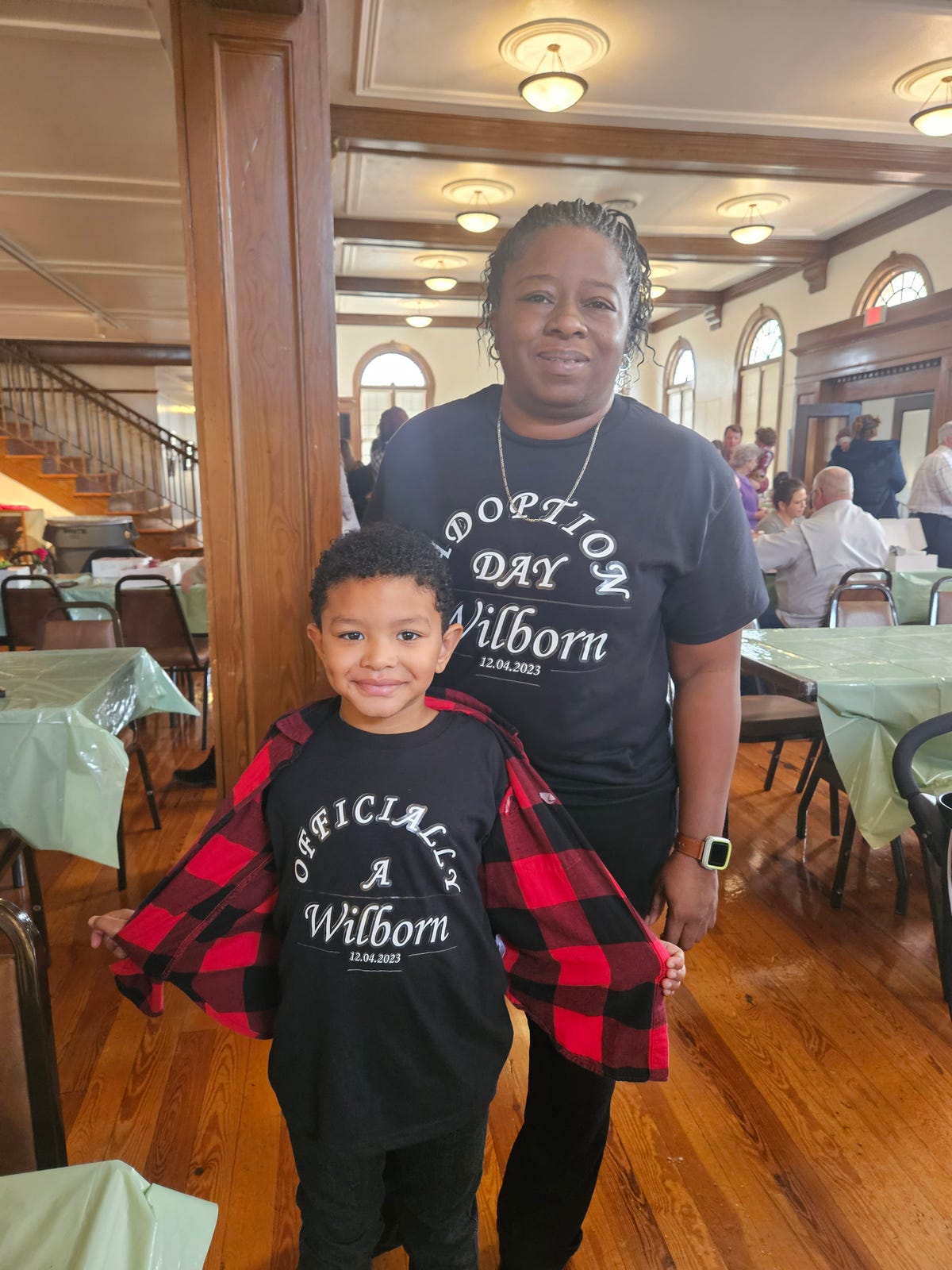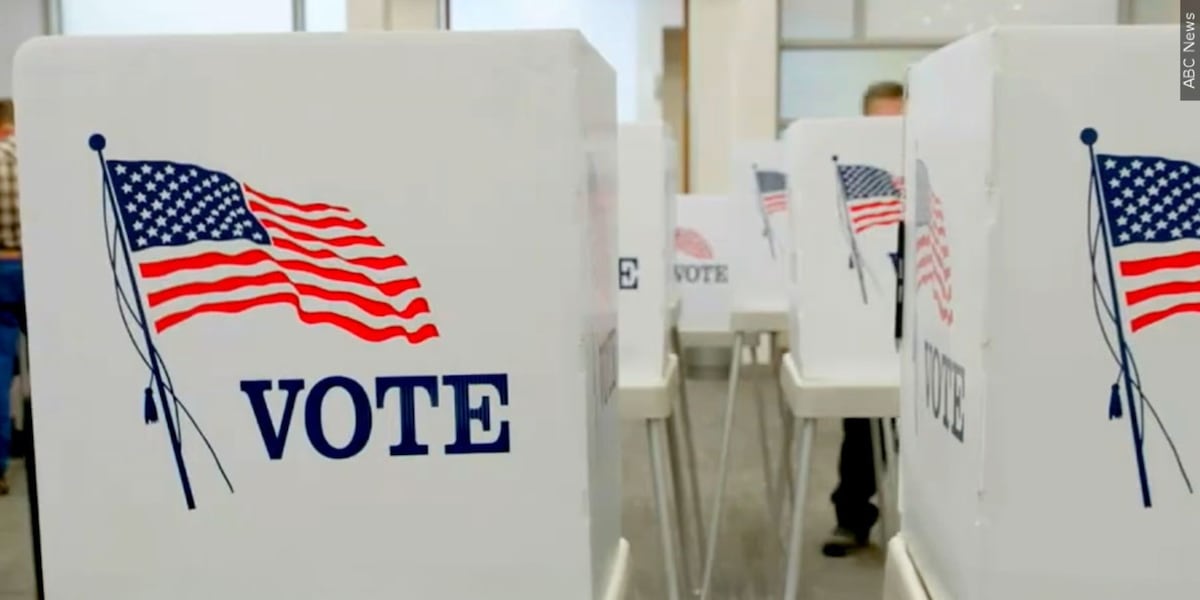Mississippi
Nine families grew by 13 members at Mississippi mass adoption ceremony in Hattiesburg

Monday was a day of celebration for nine families who welcomed 13 new members through a mass adoption ceremony at Forrest County Courthouse in Hattiesburg.
The ceremony was a joint venture between the Mississippi Department of Child Protection Services, Forrest County Youth Court and Forrest County Chancery Court.
The adoptions were finalized this month so the children could be “Home for the Holidays,” the theme for this year’s event.
Most of the cases originated in Forrest, Lamar and Stone counties, Youth Court Judge Carol Jones Russell said, but guests came from across Mississippi to support their newest family members.
“This is the perfect season to do this,” Russell said. “The children now have forever families. It is an honor to have this mass adoption celebration.”
Following the formal adoption proceedings at the courthouse, the families were invited to celebrate during a reception at the Hattiesburg Cultural Center.
Adopting a child can take anywhere between six months to two years before the child is able to achieve permanency.
“It is just a joy to be here today,” Russell said.
The Wilborn family of Hattiesburg grew by one on Monday, with 6-year-old Alex Wilborn joining his new mother Yetta Wilborn and a wealth of new grandparents, aunts, uncles and cousins for lunch and activities at the reception. Even members of the Wilborns’ church family attended the celebration.
“Today was fun,” Alex said.
Yetta Wilborn said she began fostering children in 2022, and Alex was placed with her in February. After spending time with him, she decided to make Alex’s stay permanent.
“Today has been nothing but love,” Yetta Wilborn said. “It is a great day.”
Ten-year-old Riley Akins of Enterprise was all smiles as he ate lunch with his family at the Cultural Center.
“I didn’t know it was going to be like this,” he said.
His mother Julie Akins was his teacher a year ago. She was apprehensive about getting two new students in the middle of the school year, but she felt an instant connection when the two met.
“It was something strange when I first saw him,” she said. “When I opened the door and saw him, I thought, ‘This kid is special.’”
She sent her husband a text message to tell him about the new students.
“This is going to sound crazy, but I believe the Lord spoke to my heart and said, ‘You are to adopt one of them,’” Evan Akins said.
He didn’t say anything to his wife about the calling at the time.
Later on, Julie Akins learned that Riley, who was in foster care, was not going to be reunited with his birth family.
As the couple learned more about Riley, the discovered he and Evan Akins already had a few things in common. The two share a birthday — Sept. 26. Riley’s middle name is Michael, as is Evan’s first name.
In time, Julie Akins also began to think about adopting Riley and told her husband about her feelings.
“I already know,” Evan Akins told her. “I’ve been knowing this for some time, and I’ve been waiting on you to tell me. The Lord’s already opened my heart to this. We believe the Lord put us together.”
Riley now has a sister, 13-year-old Priscilla Akins, who came to the family through a private adoption.
“Priscilla was literally brought into our home,” Evan Akins said.
Priscilla said she likes having a younger brother, even when he is annoying.
“It’s all OK,” she said.
Do you have a story to share? Contact Lici Beveridge at lbeveridge@gannett.com. Follow her on X @licibev or Facebook at facebook.com/licibeveridge.

Mississippi
Tennessee’s all-time football results versus Mississippi State

No. 15 Tennessee (3-1, 0-1 SEC) will play for its first Southeastern Conference win in 2025 during Week 5. Mississippi State (4-0) will host the Vols on Saturday at Davis Wade Stadium in Starkville, Mississippi.
Kickoff is scheduled for 4:15 p.m. EDT and SEC Network will televise the contest.
Saturday will mark the 38th game between the Vols and Bulldogs all time, dating to 1907.
Tennessee leads the football series versus Mississippi State, 30-16-1. The Vols have won the last two meetings, including a, 33-14, victory last season at Neyland Stadium.
Below are all-time football results between the Vols and Bulldogs.
Tennessee’s all-time football results versus Mississippi State
1907: Tennessee 11, Mississippi State 4
1910: Mississippi State 48, Tennessee 0
1915: Mississippi State 10, Tennessee 0
1919: Mississippi State 6, Tennessee 0
1920: Mississippi State 13 Tennessee 7
1921: Tennessee 14, Mississippi State 7
1922: Tennessee 31, Mississippi State 3
1923: Tennessee 7, Mississippi State 3
1924: Mississippi State 7, Tennessee 2
1925: Tennessee 14, Mississippi State 9
1926: Tennessee 33, Mississippi State 0
1932: Tennessee 31, Mississippi State 0
1933: Tennessee 20, Mississippi State 0
1934: Tennessee 14, Mississippi State 0
1948: Mississippi State 21, Tennessee 6
1949: Tennessee 10, Mississippi State 0
1950: Mississippi State 7, Tennessee 0
1951: Tennessee 14, Mississippi State 0
1952: Tennessee 14, Tennessee 7
1953: Mississippi State 26, Tennessee 0
1954: Tennessee 19, Mississippi State 7
1955: Mississippi State 13, Tennessee 7
1957: Tennessee 14, Mississippi State 9
1958: Tennessee 13, Mississippi State 8
1959: Tennessee 22, Mississippi State 6
1960: Tennessee 0, Mississippi State 0
1961: Tennessee 17, Mississippi State 3
1962: Mississippi State 7, Tennessee 6
1963: Mississippi State 7, Tennessee 0
1964: Tennessee 14, Mississippi 13
1971: Tennessee 10, Mississippi State 7
1978: Mississippi State 34, Tennessee 21
1979: Mississippi State 28, Tennessee 9
1986: Mississippi State 27, Tennessee 23
1987: Tennessee 38, Mississippi State 10
1990: Tennessee 40, Mississippi State 7
1991: Tennessee 26, Mississippi State 24
1994: Mississippi State 24, Tennessee 21
1995: Tennessee 52, Mississippi State 14
1998: Tennessee 24, Mississippi State 14 — SEC championship game
2002: Tennessee 35, Mississippi State 17
2003: Tennessee 59, Mississippi State 21
2007: Tennessee 33, Mississippi State 21
2008: Tennessee 34, Mississippi State 3
2012: Mississippi State 41, Tennessee 31
2019: Tennessee 20, Mississippi State 10
2024: Tennessee 33, Tennessee 14
Follow Vols Wire on Facebook and X (formerly Twitter).
Mississippi
Mississippi State football doesn’t miss Mario Craver, other overreactions to Alcorn State win

STARKVILLE — It’s difficult to determine what Mississippi State football’s lopsided 63-0 win against Alcorn State in Week 3 means for the outlook of the season, but there was certainly no indication of a potential upset.
The Bulldogs (3-0) scored touchdowns on four straight drives to begin the game and led by 42 points before halftime. The third and fourth quarters at Davis Wade Stadium were reduced from 15 to 10 minutes because of the score. MSU and second-year coach Jeff Lebby are 3-0 for the first time since 2018.
Here are four overreactions to MSU’s win before it hosts Northern Illinois (1-1) on Sept. 20 (3:15 p.m., SEC Network).
Mississippi State fans will storm the field after another upset win
Mississippi State has qualities of a team than can pull off another upset like it did to then-No. 10 Arizona State in Week 2. When the offense, defense and special teams are playing soundly, MSU is miles better than last season.
The offense, led by quarterback Blake Shapen, can score in bunches and do so quickly. The defense can string together multiple stops in a row and is forcing two turnovers per game. Kyle Ferrie has yet to miss a field goal, while Anthony Evans III is second in the SEC with 128 punt return yards.
Mississippi State’s four SEC home games are all against ranked opponents — Tennessee, Texas, Georgia and Ole Miss — so don’t be surprised if fans storm the field again in one of those games.
Kamario Taylor is a future Heisman Trophy contender
There have been glimpses of freshman quarterback Kamario Taylor and you can already tell why everyone is so excited about the four-star signee from Noxubee County.
He scored his first career touchdown in the second quarter against Alcorn State, a 42-yard on-the-money throw to Brenen Thompson. Taylor also had a great rush when he read the edge defender, tucked the ball and ran for 19 yards.
Taylor will have to wait for next season to compete for the starting job, but he has the makings to be a special player.
Mississippi State is fine without Mario Craver, Kevin Coleman Jr.
Mario Craver leads college football with 443 receiving yards for Texas A&M. Kevin Coleman Jr. of Missouri is tied for fifth nationally with 24 receptions. Both transferred after last season ended, but Mississippi State is doing just fine without them.
Evans and Thompson have been a terrific duo at wide receiver. Evans, a Georgia transfer, has filled Coleman’s role at MSU as a shorter-yard target with 17 receptions for 210 yards and two touchdowns. Thompson, an Oklahoma transfer, has played Craver’s role as a downfield burner with 15 catches for 278 yards and three touchdowns.
It’s unlikely that Mississippi State could’ve had all four of them on the same team, but losing two great wide receivers hasn’t hurt this season.
Mississippi State’s pass rush will be a weakness in SEC play
Will Whitson was playing like a premier pass rusher before his season-ending injury in Week 2. The Bulldogs haven’t been great at generating pressure though outside of him.
Whitson has two of MSU’s four sacks. He’s also still the only player for MSU with more than one tackle for loss.
The defensive front looks improved from last season, but will still need to be better for SEC standards.
Sam Sklar is the Mississippi State beat reporter for The Clarion Ledger. Email him at ssklar@gannett.com and follow him on X @sklarsam_.
Mississippi
Bulldog Roundup: Mississippi State cross country sets new mark at Southern Showcase

Friday was a special day for Mississippi State sports and it was the cross country team that got things started for the university.
The Bulldogs put in a record-breaking performance to finish in second place at the Southern Showcase in Huntsville, Ala.
“We’re really pleased with how the team raced today,” said assistant coach Erinn Stemnan-Fahey. “Today, they showed the strides the program has made towards improvement. We’re really excited to keep building on the momentum for the rest of the season.”
The team improved its finish from last year by 6 places, with three athletes finishing in the top 20 overall. Nelly Jemeli led the Bulldogs, literally. Jemeli finished fourth overall in 16-minutes, 36.1 seconds.
Louise Stonham finished 17th in her first cross country race in the maroon and white with a massive personal best of 17:10.0. Gabrielle Boulay and Hunter Anderson rounded out the scorers for state, with the latter running a personal best of 17:31.0.
Women’s Tennis: Mississippi State at Blue Gray Classic
Women’s Tennis: Mississippi State at Debbie Southern Classic
Men’s Tennis: ITF Fayetteville M15 Futures
Cross Country: Southern Showcase, Huntsville, Ala., 2nd Place
Soccer: Mississippi State 3, No. 1 Tennessee 2
Football: Alcorn State at Mississippi State
Women’s Tennis: Mississippi State at Blue Gray Classic
Women’s Tennis: Mississippi State at Debbie Southern Classic
Men’s Tennis: ITF Fayetteville M15 Futures
Volleyball: Mississippi State at Mercer, Noon
“One night, Bilbo got particularly feisty, so my dad and I drove him out to woods. Once we found a good spot, we stopped and I put him on the ground and took his collar off. He kind of ambled about, taking in the new surroundings. I preface this next part by saying I do think humans and animals share an unspoken understanding, to some extent. That’s why it’s so easy to bond with pets. So this is how I remember saying goodbye to Bilbo: He wandered 10 yards away or so from the truck, and then he turned and looked at us and kind of had this expression like, ‘It was nice knowing ya.’ It was this moment where like, both I knew and he knew that we’d had some good times, but this was it.”
– Mike Leach
POV you just beat the #1 team in the country 😤#HailState | @HailStateSOC pic.twitter.com/0aaI6iacbz
— Mississippi State Athletics (@HailState) September 13, 2025
-

 Finance1 week ago
Finance1 week agoReimagining Finance: Derek Kudsee on Coda’s AI-Powered Future
-

 World6 days ago
World6 days agoSyria’s new president takes center stage at UNGA as concerns linger over terrorist past
-
North Dakota7 days ago
Board approves Brent Sanford as new ‘commissioner’ of North Dakota University System
-

 Technology6 days ago
Technology6 days agoThese earbuds include a tiny wired microphone you can hold
-

 Culture6 days ago
Culture6 days agoTest Your Memory of These Classic Books for Young Readers
-

 Crypto6 days ago
Crypto6 days agoTexas brothers charged in cryptocurrency kidnapping, robbery in MN
-

 Crypto1 week ago
Crypto1 week agoEU Enforcers Arrest 5 Over €100M Cryptocurrency Scam – Law360
-

 Rhode Island7 days ago
Rhode Island7 days agoThe Ocean State’s Bond With Robert Redford




















